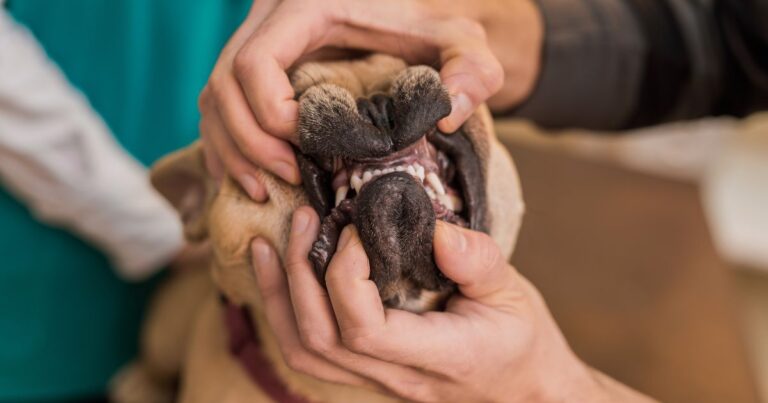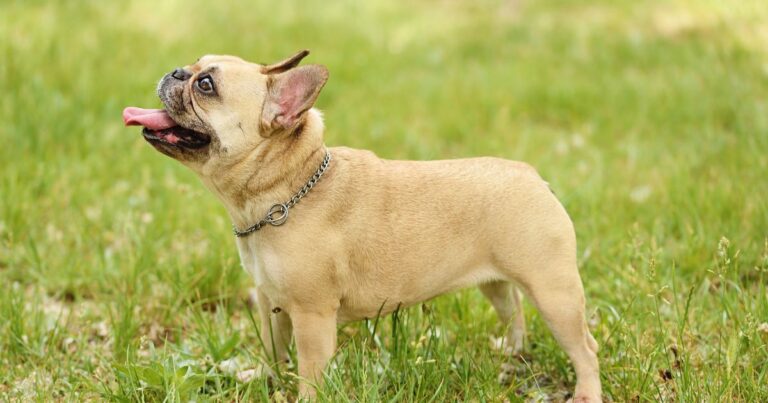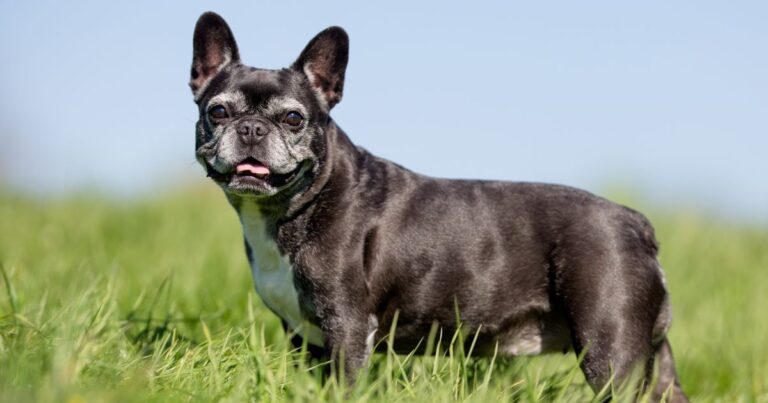Health and Care of French Bulldogs
Table of Contents
Navigating the world of health and care of French Bulldogs can feel like learning a new language. But don’t fret, fellow Frenchie fanatics! This guide will decode the do’s and don’ts of keeping your adorable bat-eared buddy in tip-top shape. So, stick around, you’re in for a tail-wagging good read!
Introduction
When it comes to the Health and Care of French Bulldogs, there’s a lot to consider. From their unique physical characteristics to their charming personalities, French Bulldogs, or “Frenchies,” are a breed like no other. This guide will provide you with all the necessary information about the Health and Care of French Bulldogs.
A dog is a reflection of the family.” This is especially true when it comes to their health and care. The effort you put into caring for your Frenchie will be reflected in their health and happiness.
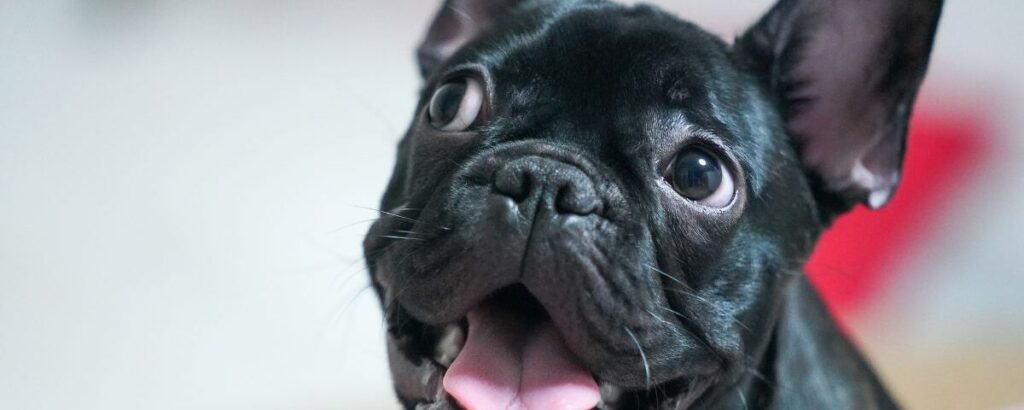
French Bulldog Health
In the context of the Health and Care of French Bulldogs, it’s important to note that French Bulldogs are a unique breed with specific health considerations that every owner should be aware of. Their distinctive appearance, with their bat-like ears and smushed faces, isn’t just for show – it also has implications for their health. Genetics play a big role in the health of your Frenchie, and there are certain genetic health problems that are more common in this breed. For instance, French Bulldogs are more likely to develop certain types of heart disease and spinal disorders. Regular health screenings can help catch these conditions early.
Health Considerations for French Bulldogs
Like any breed, French Bulldogs are prone to certain health issues, some of which are more common than others. These can include brachycephalic syndrome, hip dysplasia, and various skin conditions. It’s important to be aware of these potential issues so you can spot any signs early and seek veterinary care. While not every French Bulldog will experience these health issues, potential owners should be aware of them when considering this breed.
French Bulldog Health Conditions
| Health Condition | Description | Treatment |
|---|---|---|
| Hip Dysplasia | A heritable condition where the femur doesn’t fit snugly into the pelvic socket of the hip joint. | Treatment can include surgery, physical therapy, and medication. |
| Brachycephalic Syndrome | A disorder found in dogs with short heads, narrowed nostrils, or elongated or soft palates. | Treatment varies depending on the severity of the condition but includes oxygen therapy as well as surgery to widen nostrils or shorten palates. |
| Allergies | Allergies are a common problem in dogs. There are three main types: food-based allergies, contact allergies, and inhalant allergies. | Treatment depends on the type of allergy and can include dietary changes, medication, and avoiding certain substances. |
| Hemivertebrae | This is a malformation of one or more vertebrae that causes it to be shaped like a wedge or triangle. | There is no treatment for the condition unless there is spinal cord pressure. |
| Patellar Luxation | Also known as “slipped stifles,” this is a common problem in small dogs. It is caused when the patella is not properly lined up and slips in and out of place (luxates). | Severe grades of patellar luxation may require surgical repair. |
| Intervertebral Disc Disease (IVDD) | IDD occurs when a disc in the spine ruptures or herniates and pushes upward into the spinal cord. | Treatment usually involves nonsteroidal anti-inflammatory drugs (NSAIDS) made specially for dogs. In some cases surgery can help. |
| Von Willebrand’s Disease | This is a blood disorder that can be found in both humans and dogs. It affects the clotting process due to the reduction of von Willebrand factor in the blood. | It can be managed with treatments that include cauterizing or suturing injuries, transfusions of the von Willebrand factor before surgery, and avoiding certain medications. |
| Cleft Palate | The palate is the roof of the mouth and separates the nasal and oral cavities. A cleft palate has a slit that runs bilaterally or unilaterally and can range in size from a small hole to a large slit. | The only treatment for a cleft palate is surgery to close the hole. |
| Elongated Soft Palate | The soft palate is the extension of the roof of the mouth. When the soft palate is elongated, it can obstruct airways and cause difficulty in breathing. | The treatment for Elongated Soft Palate is surgical removal of the excess palate |

Hip Dysplasia: This inherited condition, where the femur doesn’t fit securely into the hip joint’s pelvic socket, can occur with or without noticeable symptoms. Some dogs may display pain or limping on one or both hind legs. As the dog matures, arthritis can develop. Hip dysplasia screening is performed by the Orthopedic Foundation for Animals or the University of Pennsylvania Hip Improvement Program. Breeding dogs with hip dysplasia is not recommended. Prospective owners should ask breeders for evidence that the parents have been tested and found free of hip dysplasia.
Brachycephalic Syndrome: This condition is common in dogs with short heads, narrowed nostrils, or elongated or soft palates. Their airways can be obstructed to varying degrees, leading to symptoms ranging from noisy or labored breathing to total airway collapse. Dogs with this syndrome often snuffle and snort. Treatment depends on the condition’s severity and may include oxygen therapy or surgery to widen nostrils or shorten palates.
Allergies: Dogs can suffer from three main types of allergies: food-based, contact, and inhalant allergies. Food-based allergies are managed by eliminating certain foods from the dog’s diet. Contact allergies are caused by a reaction to a topical substance such as bedding, flea powders, dog shampoos, and other chemicals, and are managed by removing the allergen. Inhalant allergies are caused by airborne allergens like pollen, dust, and mildew. The treatment for inhalant allergies depends on the allergy’s severity. Note that ear infections often accompany inhalant allergies.
Hemivertebrae: This is a malformation of one or more vertebrae that causes it to be shaped like a wedge or triangle. This malformation can occur on its own or with other vertebrae malformations. Hemivertebra can cause no problems, or it can put pressure on the spinal cord. This can lead to pain, weakness, and or paralysis. There is no treatment for the condition unless there is spinal cord pressure.
Patellar Luxation: Also known as “slipped stifles,” this common problem in small dogs is caused when the patella, which has three parts — the femur (thigh bone), patella (knee cap), and tibia (calf) — is not properly lined up and slips in and out of place (luxates). This causes lameness or an abnormal gait (the way the dog moves). It is a congenital disease, meaning it’s present at birth, although the actual misalignment or luxation does not always occur until much later. The rubbing caused by patellar luxation can lead to arthritis, a degenerative joint disease. There are four grades of patellar luxation ranging from grade I, an occasional luxation causing temporary lameness in the joint, to grade IV, in which the turning of the tibia is severe and the patella cannot be realigned manually. This gives the dog a bowlegged appearance. Severe grades of patellar luxation may require surgical repair.

Intervertebral Disc Disease (IVDD): IDD occurs when a disc in the spine ruptures or herniates and pushes upward into the spinal cord. When the disc pushes into the spinal cord, nerve transmissions are inhibited from traveling along the spinal cord. Intervertebral Disc Disease can be caused by trauma, age, or simply from the physical jolt that occurs when a dog jumps off a sofa. When the disc ruptures, the dog usually feels pain and the ruptured disc can lead to weakness and temporary or permanent paralysis. Treatment usually involves nonsteroidal anti-inflammatory drugs (NSAIDS) made specially for dogs. Never give your dog Tylenol or other NSAIDs made for people as they can be toxic. In some cases surgery can help, but it must be done within a day or so of the injury. You may also want to ask your veterinarian about physical rehabilitation. Treatments such as massage, water treadmills and electrical stimulation are available for dogs and can have excellent success.
Von Willebrand’s Disease: This is a blood disorder that can be found in both humans and dogs. It affects the clotting process due to the reduction of von Willebrand factor in the blood. A dog affected by von Willebrand’s disease will have signs such as nose bleeds, bleeding gums, prolonged bleeding from surgery, and prolonged bleeding during heat cycles or after whelping. Occasionally blood is found in the stool. This disorder is usually diagnosed in your dog between the ages of 3 and 5 and cannot be cured. However, it can be managed with treatments that include cauterizing or suturing injuries, transfusions of the von Willebrand factor before surgery, and avoiding certain medications.
Cleft Palate: The palate is the roof of the mouth and separates the nasal and oral cavities. It is made up of two parts, hard and soft. A cleft palate has a slit that runs bilaterally or unilaterally and can range in size from a small hole to a large slit. A cleft palate can affect both the hard and soft palate separately and together and may cause a cleft lip. Puppies can be born with cleft palates, or a cleft palate can occur from an injury. Cleft palates are fairly common in dogs, but many puppies born with a cleft palate do not survive or are euthanized by the breeder. The only treatment for a cleft palate is surgery to close the hole, although not all dogs with a cleft palate require the surgery. It is important to get a diagnosis and treatment recommendation from your veterinarian.
Elongated Soft Palate: The soft palate is the extension of the roof of the mouth. When the soft palate is elongated, it can obstruct airways and cause difficulty in breathing. The treatment for Elongated Soft Palate is surgical removal of the excess palate.
When purchasing a puppy, it’s crucial to find a reputable breeder who can provide health clearances for both of the puppy’s parents. These clearances confirm that a dog has been tested for and cleared of specific conditions. For French Bulldogs, you should expect to see health clearances from the Orthopedic Foundation for Animals (OFA) for hip dysplasia (with a score of fair or better), elbow dysplasia, hypothyroidism, and von Willebrand’s disease; from Auburn University for thrombopathia; and from the Canine Eye Registry Foundation (CERF) certifying that eyes are normal. You can verify health clearances by checking the OFA web site (offa.org).
Regardless of your dog’s health at the time of adoption, it’s important to be prepared for potential health issues that may arise throughout their lifetime.
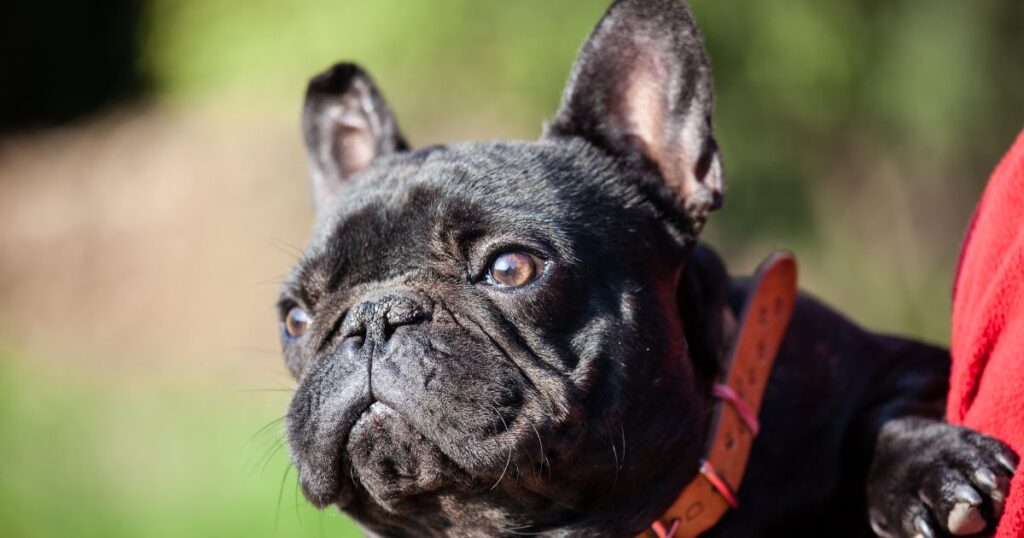
Why Does My French Bulldog Snore?
If you’ve ever wondered why your French Bulldog snores, you’re not alone. This is actually a common trait in the breed, due to their brachycephalic (short-nosed) nature. While it’s usually nothing to worry about, excessive snoring can sometimes be a sign of a health issue, so it’s worth mentioning to your vet. Why Does My French Bulldog Snore?
French Bulldog Skin Problems
Skin problems can be a common issue in French Bulldogs, but with the right care, they can be managed effectively. Regular bathing with a gentle, hypoallergenic shampoo can help keep your Frenchie’s skin healthy and free from irritation. In fact, I’ve written a detailed post on Fixing French Bulldog Skin Problems that you might find helpful
French Bulldog Mental Health
Just like humans, dogs can experience mental health issues, and it’s important to be aware of this as a French Bulldog owner. Providing plenty of socialization, mental stimulation, and a stable environment can help keep your Frenchie’s mental health in check.
French Bulldog Lifespan
French Bulldogs have a typical lifespan of 10-12 years, and there are certain considerations to keep in mind as they reach their golden years. Regular vet check-ups become even more important, and you may need to make adjustments to their diet and exercise routine. French Bulldog Lifespan: The Golden Years
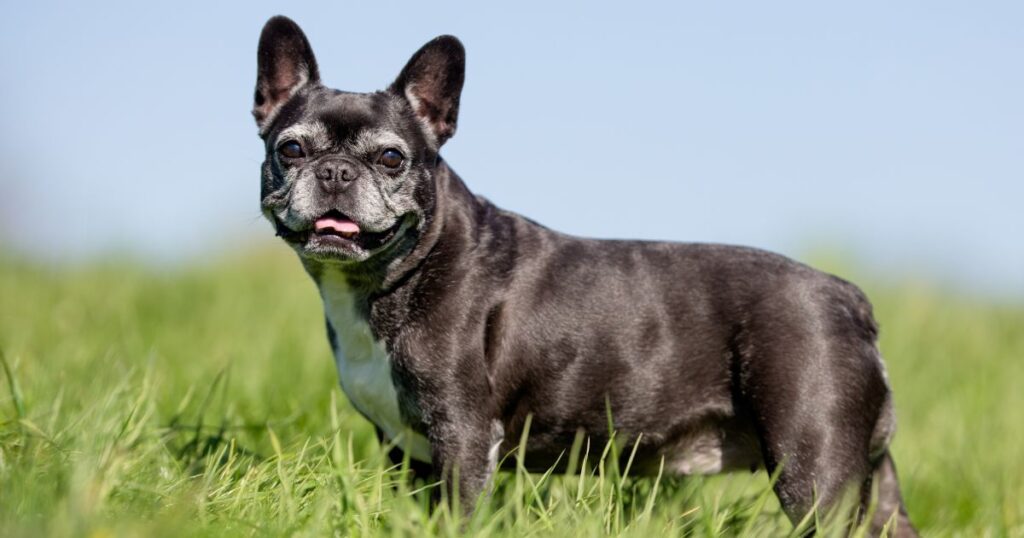
French Bulldog Care
When discussing the Health and Care of French Bulldogs, it’s important to note that caring for your French Bulldog’s health involves regular vet check-ups, a balanced diet, and plenty of exercise. Despite their laid-back nature, Frenchies still need regular physical activity to stay healthy.
When it comes to vet check-ups, it’s not just about vaccinations and the occasional health issue. It’s about preventative care. Regular check-ups allow your vet to catch potential health problems before they become serious. This is particularly important for French Bulldogs, who can be prone to certain breed-specific health issues.
As for diet, French Bulldogs can be a bit on the greedy side. It’s important to feed them a balanced diet to maintain a healthy weight. Overweight Frenchies can suffer from a range of health problems, from heart disease to joint issues. So, keep an eye on their weight and adjust their food intake as necessary.
Regular Vet Check-ups
Regular vet check-ups are crucial for keeping your Frenchie in top shape and catching any potential health issues early. Your vet can provide vaccinations, perform routine health screenings, and offer advice on diet and exercise.
French Bulldog Care Overview
| Aspect | Details |
|---|---|
| Diet | Balanced, avoid toxic/allergenic foods |
| Exercise | Regular, moderate |
| Grooming | Regular brushing, dental care |
| Vet Check-ups | Regular, more frequent in golden years |
| Mental Health | Provide socialization, mental stimulation |
Caring for a French Bulldog’s Tail
When it comes to the health and care of French Bulldogs, one aspect that often gets overlooked is the care of their tail. French Bulldogs have a unique tail that is short and often curled, known as a ‘screw tail’. Some French Bulldogs also have a hidden feature known as a ‘tail pocket’, which is a small indentation beneath the tail. This tail pocket can become a breeding ground for bacteria if not cleaned and cared for properly. Regular cleaning of the tail and tail pocket is essential to prevent irritation and infection.
Cleaning a French Bulldog’s tail and tail pocket involves gently wiping the area with a moist cloth or a hypoallergenic wipe, then drying it thoroughly to prevent moisture build-up. For French Bulldogs with a tail pocket, it may be necessary to clean the area more frequently, as dirt and debris can easily become trapped. It’s also recommended to use products like Wrinkle Paste, which forms a water-resistant barrier that keeps moisture, fungus, and bacteria at bay. Remember, a clean and dry tail is a happy tail! Read my article on “How to Take Care of a French Bulldog Tail“
Balanced Diet and Foods to Avoid
Feeding your French Bulldog a balanced diet is key to maintaining their overall health, but there are certain foods you should avoid. For instance, chocolate, grapes, and onions are toxic to dogs and should never be included in their diet.
The recommended daily serving for an adult French Bulldog is approximately 1 to 1.5 cups of high-quality dry food, ideally divided into two separate meals.
However, it’s important to note that the dietary needs of a French Bulldog can vary based on several factors. These include the dog’s size, age, physical structure, metabolic rate, and activity level. Just like humans, every dog is unique and their nutritional requirements can differ.
For instance, a French Bulldog that is highly active and spends a lot of time playing or exercising will naturally require more food than one that is less active. Similarly, the quality of the dog food you choose also plays a significant role in determining the quantity of food your Frenchie needs. High-quality dog food is densely packed with nutrients, meaning you’ll need less of it to adequately nourish your dog compared to lower quality options.
The goal is to maintain balanced nutrition for your French Bulldog, which supports their overall health and well-being. Always consult with your vet to determine the best diet plan for your specific dog, and monitor your Frenchie’s weight to ensure they’re not under or overfed.

Which French Bulldog Foods to Avoid: Toxic and Allergenic Foods
While a balanced diet is important, it’s equally crucial to know which foods can be harmful to your Frenchie. Foods like chocolate, grapes, onions, and certain artificial sweeteners can be toxic to dogs. Always check with your vet if you’re unsure about a particular food. Which French Bulldog Foods to Avoid: Toxic and Allergenic Foods
Are Frenchies Allergic To Chicken?
Chicken is a common ingredient in many dog foods, but did you know some Frenchies can be allergic to it? If your Frenchie is showing signs of an allergic reaction, such as itching or digestive upset, it’s worth discussing with your vet. Are Frenchies Allergic To Chicken?
French Bulldog Exercise Needs
While French Bulldogs aren’t the most active breed, they still need regular exercise to stay healthy. This can include short walks, playtime in the yard, or indoor games. Remember, due to their brachycephalic nature, they can overheat easily, so always provide plenty of water and avoid exercising in hot weather.
Even though they’re not the most energetic of breeds, French Bulldogs are still capable of getting a case of the zoomies! Short bursts of high-energy play can be a great way for them to get exercise. Just make sure it’s in a safe environment where they can’t hurt themselves.
Also, keep in mind that mental stimulation is just as important as physical exercise. Puzzle toys, training sessions, and socialization with other dogs can all help to keep your Frenchie’s mind sharp.
Are French Bulldogs High Maintenance?
You might be wondering if French Bulldogs are high maintenance. In terms of exercise, they’re fairly low-key. However, their grooming needs and potential health issues can require a bit more effort. Regular vet check-ups, a good diet, and a consistent grooming routine will go a long way in keeping your Frenchie healthy. Are French Bulldogs High Maintenance?
French Bulldogs have a short, smooth coat that’s pretty easy to care for. However, they do shed, so regular brushing can help to keep this under control. Also, due to their facial wrinkles, they can be prone to skin infections. Regular cleaning of these wrinkles can help to prevent this.
When it comes to health issues, French Bulldogs can be prone to a range of conditions, from breathing difficulties due to their brachycephalic nature, to hip dysplasia. Regular vet check-ups and being aware of the signs of these conditions can help to catch any problems early.
Grooming Your French Bulldog
Grooming is an important part of caring for your French Bulldog, and it’s about more than just keeping them looking good. Regular grooming can help prevent skin issues, keep their coat healthy, and even provide an opportunity to check for any signs of health issues.
Coat Care
French Bulldogs have a short, smooth coat that requires regular care to keep it healthy and shiny. Regular brushing can help remove loose hair and distribute natural oils, keeping their coat looking its best.
Dental Care
Dental care is often overlooked, but it’s an important part of your Frenchie’s overall health. Regular brushing and professional cleanings can help prevent dental disease, which can lead to more serious health issues if left untreated.

French Bulldog Adoption
If you’re considering bringing a Frenchie into your home, it’s important to understand what adoption entails in terms of the Health and Care of French Bulldogs. This includes understanding the breed’s health needs, being prepared for the financial commitment, and making sure you have the time and energy to devote to your new furry friend. French Bulldog Adoption: Bringing Home a Frenchie
Adopting a French Bulldog can be a wonderful experience. They’re a breed full of personality and they can make great companions. However, it’s important to be aware that they can come with some health issues. Before adopting, make sure you’re prepared for the potential vet bills that can come with these.
Also, while French Bulldogs aren’t the most high-energy breed, they still need care and attention. This includes daily exercise, regular grooming, and plenty of interaction. If you’re ready to provide all this, then a Frenchie could be the perfect addition to your family.
Conclusion
Caring for your French Bulldog’s health involves a combination of regular vet care, a balanced diet, regular exercise, and proper grooming. With the right care and attention, your Frenchie can lead a happy, healthy life.
The key to a healthy and happy French Bulldog is a combination of proper diet, regular exercise, routine vet care, and lots of love. With these, your Frenchie will be a joyful addition to your family for years to come.
Call to Action
Now that you’re equipped with this knowledge, you’re ready to provide the best care possible for your French Bulldog. Remember, every Frenchie is unique, and what works for one may not work for another. Always consult with your vet to determine the best care plan for your individual dog.
Please check out my previous page: French Bulldog Autoimmune Disorders
Frequently Asked Questions
What are some common health issues in French Bulldogs?
French Bulldogs are prone to certain health issues such as hip dysplasia, brachycephalic syndrome, allergies, and skin problems. It’s important to be aware of these potential issues and seek veterinary care if you notice any symptoms.
How often should I take my French Bulldog for vet check-ups?
Regular vet check-ups are crucial for keeping your Frenchie in top shape and catching any potential health issues early. It’s recommended to have at least an annual check-up, but puppies, senior dogs, or dogs with health issues may need to visit the vet more frequently.
What kind of diet is best for a French Bulldog?
A balanced diet is key to maintaining your French Bulldog’s overall health. This should include high-quality dog food formulated for their specific age, size, and health condition. It’s also important to know which foods can be harmful to your Frenchie, such as certain toxic and allergenic foods.
How much exercise does a French Bulldog need?
While French Bulldogs aren’t the most active breed, they still need regular exercise to stay healthy. This can include short walks, playtime in the yard, or indoor games. However, due to their brachycephalic nature, they can overheat easily, so always provide plenty of water and avoid exercising in hot weather.
Are French Bulldogs high maintenance?
In terms of exercise, French Bulldogs are fairly low-key. However, their grooming needs and potential health issues can require a bit more effort. Regular vet check-ups, a good diet, and a consistent grooming routine will go a long way in keeping your Frenchie healthy.
What does adopting a French Bulldog entail?
Adopting a Frenchie involves understanding the breed’s health needs, being prepared for the financial commitment, and making sure you have the time and energy to devote to your new furry friend. It’s important to do your research and consider adopting from a reputable breeder or rescue organization.
What are some grooming needs of a French Bulldog?
French Bulldogs have a short, smooth coat that requires regular care to keep it healthy and shiny. Dental care is also an important part of your Frenchie’s overall health. Regular brushing and professional cleanings can help prevent dental disease.
Can French Bulldogs have mental health issues?
Just like humans, dogs can experience mental health issues. It’s important to be aware of this as a French Bulldog owner and provide a supportive and stress-free environment for your pet. If you notice any changes in your Frenchie’s behavior, it’s important to consult with a vet or a pet behaviorist.
What is the typical lifespan of a French Bulldog?
French Bulldogs typically live between 10-12 years. However, with proper care and regular veterinary check-ups, some Frenchies can live longer.
Are French Bulldogs prone to any genetic health problems?
Yes, French Bulldogs can be prone to certain genetic health problems such as hip dysplasia and certain types of allergies. It’s important to get your Frenchie from a reputable breeder who tests their breeding dogs for these and other genetic diseases.
What should I know about French Bulldogs and allergies?
Allergies are a common problem in French Bulldogs. They can be allergic to certain foods, substances they come into contact with, or airborne allergens. If your Frenchie is showing signs of an allergy, such as itching, redness, or digestive issues, it’s important to consult with a vet.
What should I do if my French Bulldog snores?
Snoring is common in French Bulldogs due to their brachycephalic nature. While it’s usually not a cause for concern, excessive or loud snoring can be a sign of a health issue like an elongated soft palate or other breathing issue. If you’re concerned about your Frenchie’s snoring, it’s best to consult with a vet.
Disclaimer
This article is intended to provide general information on French Bulldog health and care. It is not intended to replace professional veterinary advice. Always consult with a licensed veterinarian for medical advice.

